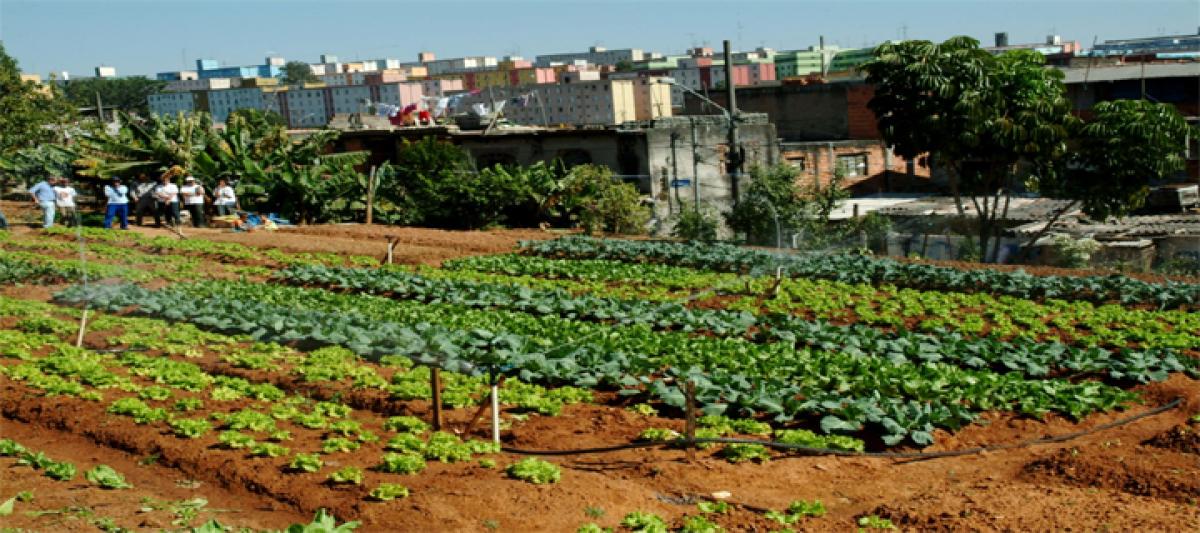Live
- ‘Dilruba’ team comes with first single ‘Aggipulle’ unveiled
- Legal drama ‘Court - State vs A Nobody’ set for March release
- Priyadarshi’s ‘Premante’ gets announced with grand launch
- Minister Jupally Reviews Rythu Bharosa Scheme Implementation in Nizamabad
- Wanaparthy collector reviews on survey of welfare schemes
- NDRF, NDA always come to rescue in case of disasters
- ‘Bhairavam’ teaser is just around the corner
- ‘Shiva Sambho’ blends culture and devotion in Telugu cinema
- Akash Jagannadh extends generous support to veteran Actress Pavala Syamala
- 'Attack' on Kejriwal: Atishi claims BJP wants to harm ex-CM, Parvesh hits back
Just In
Time for Urban agriculture- cultivating soils in the city

16 Oct 2015 3:02 PM IST

x
Highlights
The rapid growth of cities in the developing world is placing enormous demands on urban food supply systems. As a result, there is a transformation witnessed in some of the countries by focusing on Urban Agriculture.
The rapid growth of cities in the developing world is placing enormous demands on urban food supply systems. As a result, there is a transformation witnessed in some of the countries by focusing on Urban Agriculture.

With most living in urban areas, agriculture is increasingly spreading to towns and cities and an increasing number of people are engaging in urban agriculture globally. Urban and peri-urban agriculture (or UPA) can provide fresh food, generate employment, recycle urban wastes, create greenbelts and strengthen cities’ resilience to climate change. Notably, UPA is also having a positive impact on urban soils.
How horticulture and community gardening help grow nutritious food for city dwellers and restore soils in urban areas
It is widely known that soils and vegetation have a reciprocal relationship. Fertile soil encourages plant growth by providing plants with nutrients, acting as a water holding tank, and serving as the substrate to which plants anchor their roots. In return, vegetation prevents soil degradation by stabilizing the soil, maintaining water and nutrient cycling, and reducing water and wind erosion.
In order to ensure healthy food and plants, urban gardeners and farmers must first ensure a healthy soil, making sure that there are no contaminants in the soil or water being used.
By converting vacant lots to productive, well-managed community gardens, degraded soil is restored and safeguarded for the production of food and the creation of green belts in urban areas. Restoring soil quality and fertility also yields benefits such as increased carbon sequestration, reduced storm water runoff and improved water-holding capacity.
It is estimated that garden plots can be up to 15 times more productive than rural holdings. An area of just one square metre can provide 20 kg of food a year.
The intensive cultivation of a wide range of vegetables, roots and tubers, and herbs in small spaces, known as micro-gardening, is sustainable and highly productive and can be easily managed by anyone. The studies show that a micro-garden of one square metre can produce any one of the following:
• Around 200 tomatoes (30 kg) a year
• 36 heads of lettuce every 60 days
• 10 cabbages every 90 days
• 100 onions every 120 days
From the soil up
Good agricultural practices and sustainable soil management are central to ensuring that urban and peri-urban horticulture (or UPH) is environmentally sustainable and that the produce grown is of high quality.
Ensuring product quality while protecting the environment is crucial for sustainable soil management of the cities is the need of the hour, as this is directly linked to soils. Encourage Farmer Field Schools to promote intensification and diversification of horticultural production. Field schools introduce small-scale growers to Integrated Production and Protection Management (which reduces the use of toxic chemicals to control pests and diseases), and to improved cultivars and cropping practices adapted to local conditions.
By fostering good agricultural practices, field schools help to build sustainable production systems that are environmentally friendly and ensure the safety and quality of produce. FAO projects encourage the use of organic compost in urban environments and train vegetable growers in the safe recycling of wastewater for irrigation. All of these practices impact directly on urban soils, restoring them and safeguarding them for future generations.
The role of citizens
Citizens can help by preserving and increasing vegetation in their own gardens or community gardens by planting more. Get more people involved by starting a community garden. Always practice sustainable soil management like composting, which enhances overall soil health; and finally, spread the word about soils and raise awareness for this silent ally.
Rajendera Kumar

Next Story
More Stories
© 2025 Hyderabad Media House Limited/The Hans India. All rights reserved. Powered by hocalwire.com






